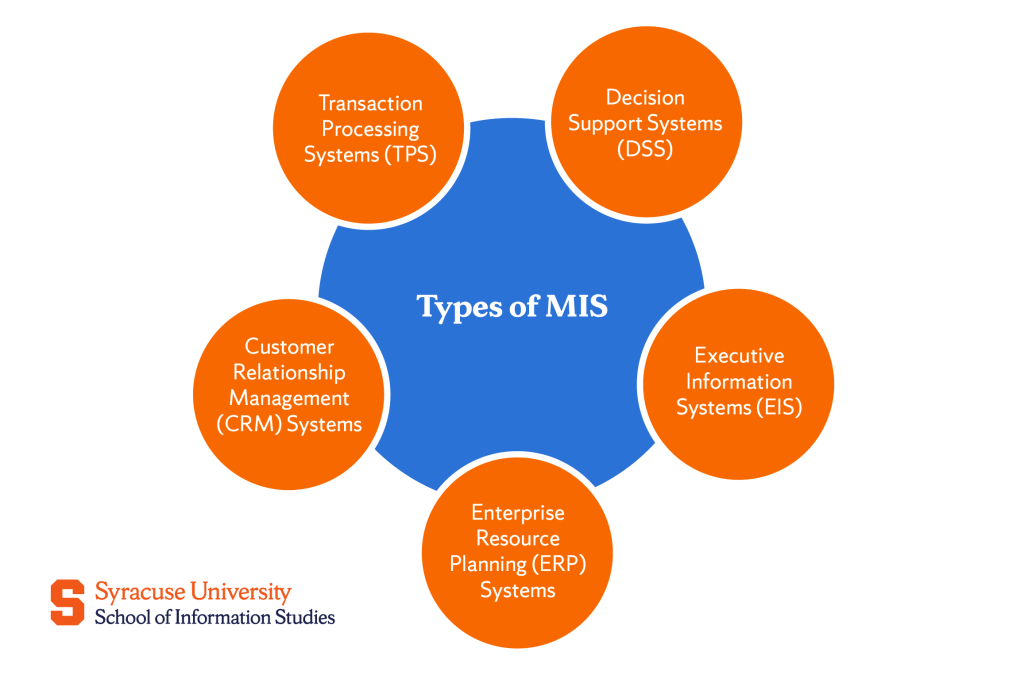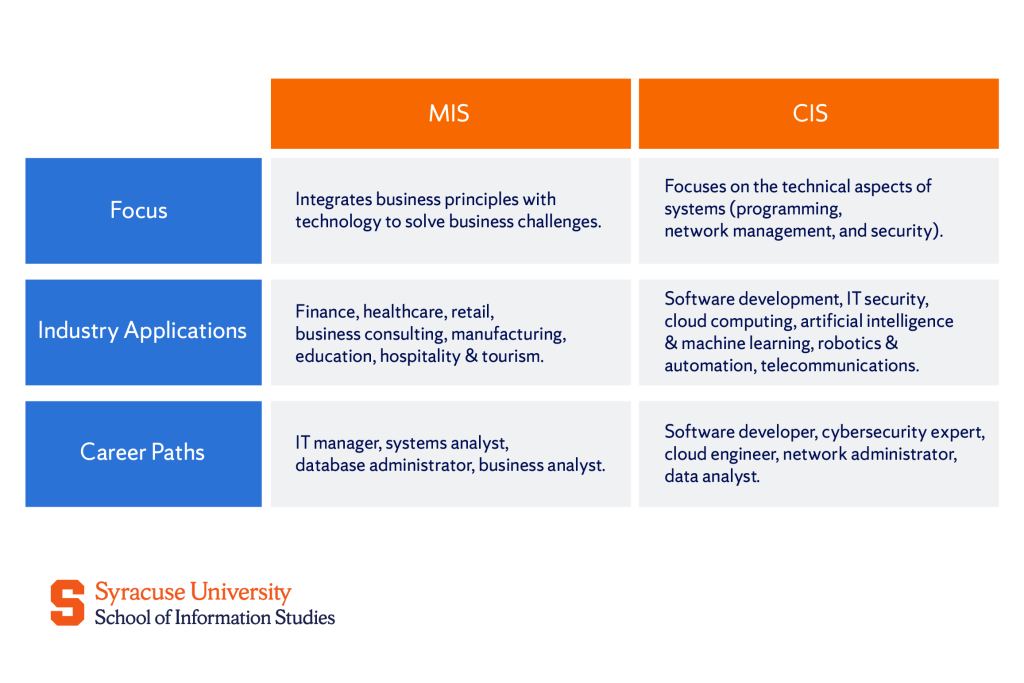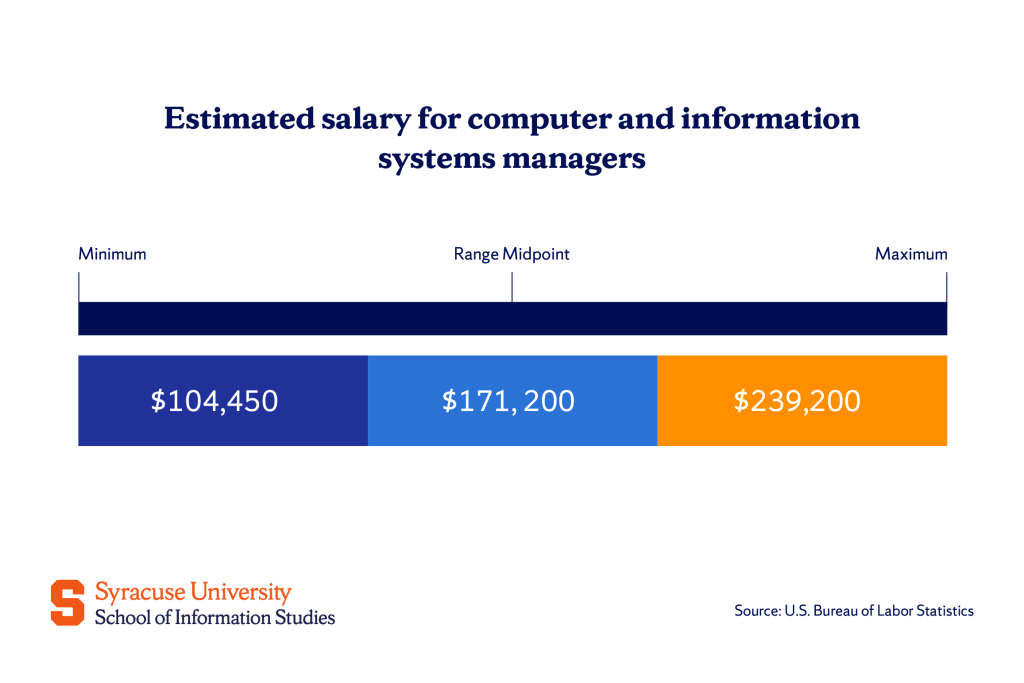Key Takeaways
- CIS (computer information systems) deals with the technical side of systems, while MIS (management information systems) combines tech with business solutions.
- Businesses use MIS to track sales, customer data, and inventory, helping them make informed decisions.
- By developing applications, securing networks, and managing cloud services, CIS professionals make sure that systems run smoothly and securely.
Information is often misunderstood and confused with data. While the latter is simply raw numbers and facts—like a sales report full of figures—information is the result of processing and interpreting that data to reveal meaningful insights.
To work with the two, businesses rely on information systems (IS). These systems are made up of interconnected components designed to help organize the raw data and turn it into insights so that decision-makers can have the right information at the right time.
Within the broader field of information systems, two key areas stand out: management information systems (MIS) and computer information systems (CIS). While both are crucial to businesses, they serve different purposes—something we’ll explore as we break down and compare MIS vs. CIS.
What Is MIS?
Management information systems help organizations by incorporating technology to manage their information and streamline their operations. MIS involves gathering, processing, storing, and analyzing data to improve decision-making and overall efficiency.
Businesses use MIS to monitor sales, track customer data, or manage inventory levels, all of which provide important information and thus enable them to make data-driven decisions.
Types of MIS
MIS is not just one system; it encompasses various tools that focus on different aspects of business management.
Some of the most common types are:
- Transaction processing systems (TPS): Designed to handle and record business transactions, such as processing sales or payments.
- Decision support systems (DSS): Assist in evaluating different scenarios and help executives consider potential outcomes when making decisions.
- Executive information systems (EIS): Provides top-level executives with quick access to important performance indicators and summary reports.
- Enterprise resource planning (ERP) systems: Integrate different business functions, like inventory management, finance, and human resources, into one unified system.
- Customer relationship management (CRM) systems: Track and manage customer interactions and data.

What Is CIS?
Computer information systems focus more on the technical side of technology. These systems are used for designing, developing, and managing the computer systems, software, and networks that make it possible for information systems to function.
For instance, professionals in CIS might develop software solutions or create a company’s website.
Types of CIS
Just like MIS, CIS also has various specializations or areas of focus that are centered on different aspects of information management.
Some key ones include:
- Software development: Focuses on designing and creating applications like mobile apps or enterprise software to meet specific business needs.
- Network administration: Responsible for maintaining and managing computer networks for reliable and secure communication between systems.
- Cybersecurity: Protects systems and networks from cyber threats so that sensitive data remains secure and confidential.
- Database management: Organizes and manages databases so that data is accessible for analysis.
- Web development: Involves designing and building functioning websites or web applications.
Key Differences Between MIS and CIS
Their names may seem similar, but MIS and CIS lead to very different career paths and skill sets. Understanding where they differ is important, especially for students interested in pursuing a career related to information systems.
Educational requirements
MIS is often part of business degrees that integrate technology with business principles. The aim is to prepare students to apply IT solutions to business challenges, with a strong emphasis on management, strategy, and organizational systems. Whereas CIS tends to fall within a computer science or IT program, focusing more on the technical side of information systems, such as programming, network management, and systems security.
At Syracuse University’s iSchool, students interested in MIS can begin with a Bachelor’s in Information Management and Technology. This program equips students with the skills to manage information systems and apply tech solutions within a business context.
Additionally, the Master’s in Information Systems provides an opportunity to further develop your expertise and hone your leadership and management skills, preparing you for leadership roles. For students who prefer more specialized training, we also offer a Certificate of Advanced Study in Information Technology Management, perfect for gaining additional skills without committing to a full master’s degree.
At the highest level, our Doctorate of Professional Studies in Information Management provides an advanced understanding of information systems management, equipping graduates for executive roles in the industry.
For those more interested in pursuing CIS, a better choice would be to start with a computer science or IT-focused program, such as a bachelor’s in computer science, followed by a more technical master’s degree if they want to deepen their skills.
Whether you’re drawn to the business side of information systems with MIS or the more technical aspects with CIS, choosing the right program ensures you gain the skills needed for success.
Typical courses
The courses you’ll take in MIS and CIS will reflect the different focuses of each field. MIS-relevant programs will most likely feature courses related to:
- Business analytics
- Database management
- Project management
- Digital strategy & analytics for the web
- Managing information systems projects
CIS-relevant programs, on the other hand, offer courses tailored more toward:
- Programming
- Cybersecurity
- Cloud computing
- Blockchain management
- Data administration concepts
Core focus areas
Both MIS and CIS are connected through their use of technology to manage data, but they diverge in their specific focuses.
MIS is centered around how technology can be applied to improve business operations. In contrast, CIS focuses more on the technical aspects of information systems—designing, developing, and managing the software, networks, and infrastructure that support the storage, processing, and security of data.
While both fields rely on technology, MIS is more aligned with the business side, and CIS leans toward the technical side.

Industry applications
For MIS, industries that benefit from the integration of business and technology include:
- Finance
- Healthcare
- Retail
- Business consulting
- Manufacturing
- Education
- Hospitality & tourism
By digging into the right data, MIS provides insights that help organizations craft better strategies, fine-tune their processes, and boost their efficiency. Whether it’s getting a better grasp of customer behaviors, spotting financial trends, or just getting a sense of how things are running day-to-day, MIS is there to guide decision-making, ensuring companies stay on track to reach their long-term goals and keep moving forward.
Meanwhile, CIS professionals are crucial in industries focused on the technical aspects of information systems, including:
- Software development
- IT security
- Cloud computing
- Artificial intelligence & machine learning
- Robotics & automation
- Telecommunications
They help organizations in these industries design and maintain the software and infrastructure that drives business operations. By developing applications, securing networks, and managing cloud services, CIS professionals make sure that systems run as intended and that they do so securely. Their work supports the creation of reliable technology solutions that enable businesses to store, process, and protect data, ultimately enhancing performance and safeguarding sensitive information.
Career paths
MIS and CIS professionals occupy different roles as a result of their differences in focus and application. Professionals in MIS tend to work more on the business strategy side, while CIS professionals focus on the technical systems that make these strategies possible.
Some common career options in MIS include:
- IT manager, overseeing tech infrastructure to support business goals.
- Systems analyst, improving business systems with tech solutions for better efficiency.
- Database administrator, managing databases for efficient storage and easy access.
- Business analyst, using data to guide decisions and align with business objectives.
CIS careers usually encompass roles such as:
- Software developer, designing and building applications.
- Cybersecurity expert, protecting systems and data from cyber threats.
- Cloud engineer, managing cloud services.
- Network administrator, maintaining networks for secure communication between systems.
- Data analyst, interpreting data to help businesses make decisions.
Salary and Job Outlook for MIS vs. CIS
When it comes to salary and job prospects, both MIS and CIS fields offer promising opportunities. The median annual salary for computer and information systems managers is roughly $171,200, which is a solid figure that reflects the high demand for these roles.

Of course, earnings can vary widely depending on experience and position—those in the lowest 10% of this group earn around $104,450, while the highest earners make over $239,200 annually.
The job outlook for these professionals is just as bright. Employment is expected to grow by an impressive 15% from 2024 to 2034, with about 55,600 job openings projected annually over the next decade. This growth is driven by the increasing reliance on technology and data across industries, further cementing the value of both MIS and CIS professionals in many industries nowadays.
Which Degree Should You Choose?
When deciding between MIS and CIS, the final choice should be about where your interests lie—whether you’re more intrigued by the business side, where you’ll use technology to improve operations and decision-making, or if you’re more drawn to the technical side, where you work with coding, systems design, and network security.
Take some time to reflect on which area you believe you’d fit better in and want to spend your professional career learning and growing in. MIS is the more suitable choice if you’re keen on understanding how technology drives business and solving organizational challenges. But, if you enjoy programming and working directly with the technical infrastructure, then CIS could be your calling.
Making Your Decision
With the increasing integration of AI and machine learning, the expansion of blockchain applications, the Internet of Things (IoT), and other emerging technologies, information systems are expected to play an even greater role in the future of businesses.
With these advancements, the need for MIS and CIS professionals will remain strong. MIS professionals will continue to bring business and technology together, while CIS professionals make sure that they have the technical infrastructure to do so. So, regardless of whether you pursue MIS or CIS, you can be confident that both fields will offer exciting and promising career opportunities.
What’s more important is making sure that you’re fully prepared for whichever role you choose, and for that, you need the right education. With 93% of our graduates landing jobs, iSchool boasts the highest job placement rate at the university—so join us and become part of this success!
Frequently Asked Questions (FAQs)
Which is a better degree, MIS or CIS?
It really comes down to what you’re passionate about! If you’re into blending business and tech, MIS is your best bet. But, if you’re more excited about coding, programming, and the technical aspects of systems, then CIS could be the way to go.
Is a CIS degree worth it?
Definitely! A CIS degree can open up some great doors, especially in areas like software development, cybersecurity, and network management, where there’s always demand for skilled professionals.
Can I switch from MIS to CIS or vice versa during my studies?
Generally, it is possible to switch between MIS and CIS, though it may require adjusting your course load to meet the requirements of the new degree.
What are the biggest challenges faced by professionals in MIS and CIS?
One of the biggest challenges in MIS is making sure technology aligns with business goals, while in CIS, it’s all about staying ahead of the curve with fast-evolving tech and keeping systems secure and reliable.
